Meet a FLAS Recipient
Meet a FLAS Recipient
Sarah Moore
Majoring in Asian Studies and minoring in Korean Studies
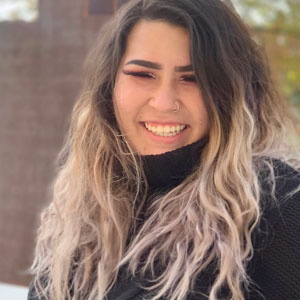 I study Korean on campus!FLAS made it possible for me to make the final decision on majoring in Asian Studies.
This award has honestly helped push me in the direction that I have wanted to go and
supported me and my decisions (thank you Patrick Cheney and immense thanks to Professor
Koeun Park and Professor Deberniere Torrey). This scholarship has also excelled my
language learning opportunities and now I am happy to say that I have and can comfortably
communicate with my family in South Korea without worrying about a huge language barrier.
This award has allowed me to connect with my family along with getting a degree- how
many awards can you say do both?
I study Korean on campus!FLAS made it possible for me to make the final decision on majoring in Asian Studies.
This award has honestly helped push me in the direction that I have wanted to go and
supported me and my decisions (thank you Patrick Cheney and immense thanks to Professor
Koeun Park and Professor Deberniere Torrey). This scholarship has also excelled my
language learning opportunities and now I am happy to say that I have and can comfortably
communicate with my family in South Korea without worrying about a huge language barrier.
This award has allowed me to connect with my family along with getting a degree- how
many awards can you say do both?
APPLY! If you are interested in a language and are determined to continue your studies with the language, please apply! It has been such a huge help to my academic career and has allowed me to attend school without worrying about tuition. The application process does seem daunting, but it is all worth it in the end. I used to be the student that if I saw an application that was longer than one page, I would just pass it up. I am forever grateful that I didn't do that with the FLAS scholarship.
I hope to study abroad in South Korea for a few semesters after I graduate. I want to experience being abroad within a community that I am familiar with but at the same time a stranger to. While in South Korea I want to pursue a degree in Psychology while also engaging with the community, such as teaching English to students.
When you are a part of FLAS, you are a part of a community. I am so lucky to be a part of this fellowship because I have gotten to know more faculty within the University of Utah and more opportunities have been opened to me because of being in this fellowship. Meeting and networking with individuals within FLAS has helped me connect with individuals across multiple disciplines on campus. A language isn't something that you stop learning or using within school, it is a highly sought-after skill post-grad and will continually bring opportunities to you.
Alessandro Easthope
MA Asian Studies
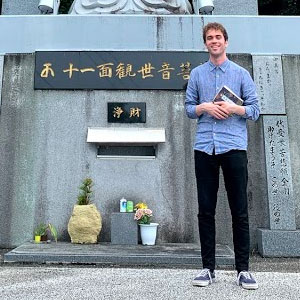 FLAS enabled me to study Japanese full time. For a language like Japanese where the
grammar and expressions are very different from English, a lot of practice time is
required to get conversational. What's more, the writing system requires intense
memorization and drilling so I'm very happy to have been able to focus exclusively
on language acquisition and research for two years as a Master's student. It has
already brought me great career opportunities and will continue to do so going forward.
Students who are thinking about applying should go for it! Before you apply, I recommend
you think long and hard about not only your professional goals, but what you love
about other cultures and languages. I think it's important to enjoy what you're studying
and let the FLAS further enrich your life. Going forward, I want to work in international
relations or education and continue to use my language skills in everyday life.
FLAS enabled me to study Japanese full time. For a language like Japanese where the
grammar and expressions are very different from English, a lot of practice time is
required to get conversational. What's more, the writing system requires intense
memorization and drilling so I'm very happy to have been able to focus exclusively
on language acquisition and research for two years as a Master's student. It has
already brought me great career opportunities and will continue to do so going forward.
Students who are thinking about applying should go for it! Before you apply, I recommend
you think long and hard about not only your professional goals, but what you love
about other cultures and languages. I think it's important to enjoy what you're studying
and let the FLAS further enrich your life. Going forward, I want to work in international
relations or education and continue to use my language skills in everyday life.
Jacob Rigby
Majoring Political Science, Minoring in History and Asian Studies
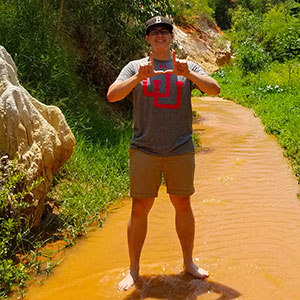
I study Vietnamese and received a FLAS scholarship to study in Vietnam summer 2019. Vietnamese is a moderately difficult language to learn, there are tones, different words you use for specific situations and grammar structures, and there are numerous different accents with their own vocabulary which is both unique and confusing when listening to people from different parts of Vietnam.
By being able to study abroad in Vietnam I was able to learn more about my culture and heritage and can improve my Vietnamese language skills. I hope to be able to use these skills in a future career as a collegiate professor or in the Intelligence community. The skills I learned abroad are irreplaceable and extremely valuable in helping me appreciate media and art in Vietnamese.
I would tell every student to try and apply for a FLAS scholarship. Having that experience is priceless and is extremely helpful when applying for various jobs and internships. This can only help you, and at the very least, you learned a second or third language.
I hope to be a collegiate professor and teach Vietnamese history or Political relations within Southeast Asia, alternatively, I also would like to work as an intelligence analyst for the NSA or as a linguistic analyst.
Living in Vietnam during the summer was fantastic, I had lived there before, but now I could have a genuine college experience as I studied there. I was also able to meet relatives and travel with them to my mother's hometown and explore my ancestral lineage and experience for myself what life was like for them. After I initially lived in Vietnam a few years before my FLAS scholarship, I fell in love with the people, the country, and the beauty that exists within this hidden gem.
Sami Mosher
MA Asian Studies, Japanese Cultural Anthropology and Linguistics
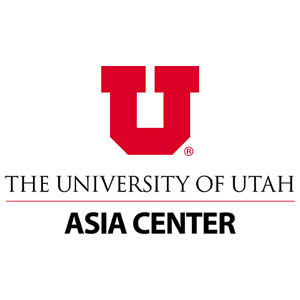
I studied Japanese, and later, Mandarin as there were no other Japanese courses left for me to take. Mandarin is useful as it helps me read older Japanese texts more fluently.
I could never have completed my masters if it weren't for FLAS. The financial support was immeasurable. A masters degree requires a lot of attention and care, which is extremely challenging while working to support oneself. It would have taken me 3-4 years to complete the degree requirements and thesis if it weren't for FLAS.
It is a fantastic opportunity, and you won't regret applying. Pay attention to detail and make it clear what your goals are.
I'd like to write my own Japanese textbook series one day. Most of the existing textbooks are lacking in some way, or are confusing/misleading about the use of the language. I also hope to lecture in Japan as a visiting professor, but that is still several years away.
Joe Van Alstyne
Majoring in Japanese
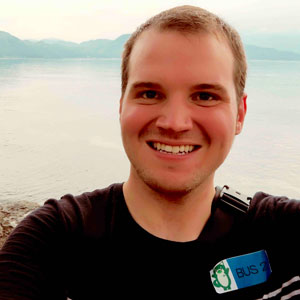
At the time I write this, it's been just over five months since I've moved to Japan to participate in an exchange program between the University of Utah and my host university Akita International University (AIU). AIU lies in the mid-southern region of Akita City, a modest city just slightly larger than Salt Lake City proper in both geography and population. Salt Lake City is much colder during the average winter, but the snowfall in Akita City has it beat by nearly three times! (No surprise then that Akita is famous for its skiing, too.) However, I think the one thing that has amazed me the most about this study abroad experience is not necessarily that the culture here is wildly different from my own—as is inherent with being halfway across the globe—but that for every difference exists some similarity.
One of the most formative experiences I've had so far was a class I took during the fall semester, called Akita Rural Studies. In this course, we cooperated with a small village within Akita City with a population of less than 250, over half of which are 65 years of age or older. This village is named Kayagasawa. They taught us about their local traditional performing arts, bangaku. The community welcomed me along with the rest of the class, where we learned directly from the members of the community about the struggles they face with depopulation and aging not only to keep bangaku alive but to keep their farming-based economy healthy as well. The instruction included members of the Bangaku Preservation Society teaching us dances traditionally used in bangaku.
At the end of the semester, at their local cultural festival, we performed the dances they taught us and afterward had the opportunity to mingle with them over a meal. Though at times it was a challenge to understand their dialect of Japanese even with my intermediate-level knowledge of the language, it was a fantastic opportunity to practice using Japanese to communicate with them and learn about life in the countryside of Akita, and even teach them a little about life in the United States.
Overall, I'd say the most important thing I've learned from this class and my time so far here in Japan (especially in the midst of widespread conflict back home in the states) is simple. While our differences in cultures should be celebrated and embraced, what unites us is the humanity and joy we can find in not only cultural traditions and the performing arts, but also communicating with and respecting one another as global citizens.
Sambat Jerry Kim
Majoring in International Studies and Communication
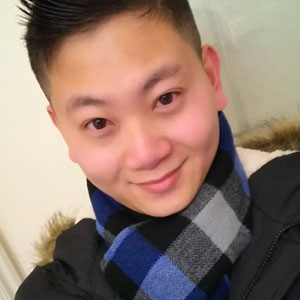
I know that since I was young, I aspire to choose a career that allow me to work abroad and use my education locally and internationally. Currently, I am majoring in International Studies with an emphasis in Trade and Commerce and minoring in Communication at the University of Utah. Pursuing degrees in International Studies and Communication will allow me to work in International Business, Education and work for the U.S Embassy in the future. I was a transfer student from Salt Lake Community College. Before I start my new adventure at the University of Utah, I applied for FLAS Scholarship for Cambodian language and I received it. Words cannot express how happy I am and so thankful for FLAS Scholarship because one of my dream is to work for the U.S Embassy in Cambodia. Now, FLAS Scholarship gives me the opportunity to learn my native language, gain the knowledge from native instructor and use these experiences for my future careers.
Caitlin Silianoff
Majoring in Chinese
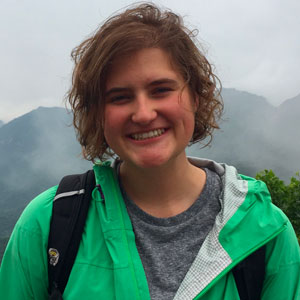
If you are interested in learning a language, the best way to gain proficiency is
to spend time in a country where that language is spoken. Interacting with native
speakers and immersing yourself in the culture and daily life of a country is invaluable
when it comes to learning, and the FLAS scholarship has given me an opportunity to
do that during a six-week intensive language course in Tianjin, China. I am interested
in international politics, specifically in the area of US-China relations, and having
a thorough understanding of the Chinese language and culture will be immensely beneficial
as I pursue this path. The FLAS scholarship allowed me to focus deeply on language
study during my intensive program and has reinforced my interest in studying Chinese.
Studying Chinese in China has been challenging in many ways: the difficult language
coupled with a vastly different culture has lead to many confusing and sometimes comical
events. On the whole, however, I know this experience is beneficial both while I am
abroad and when I return home. Studying on a FLAS scholarship has given me an opportunity
to improve my Mandarin significantly, and it has also reminded me of how much progress
I have yet to make. After my program, I will be returning to Utah motivated to work
harder, learn more, and continue with the study of international politics.
Sherry Liao
Majoring in Chinese
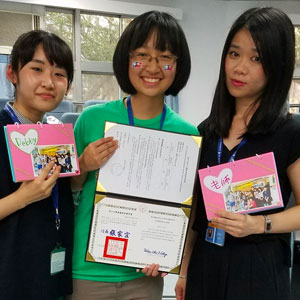
My family comes from Taiwan, but I was born and raised in the United States. I am blessed to be a native mandarin speaker and be able to speak to my parents at home. However, before the program, I had little to no ability to read or write in mandarin Chinese. As a result, one of my dreams since I was very young was to become completely fluent in Mandarin Chinese. The FLAS Scholarship gave me the opportunity to attend the six-week Intensive Chinese Language Program at Tamkang University in New Taipei City, Taiwan. We had language and culture classes Monday through Thursday. On Fridays, we were taken to places in Taiwan to experience traditional Taiwanese culture, practice our Chinese in real world settings, and explore the natural landscape of Taiwan. I really enjoyed the language and culture classes, because I was in a class of ten people. With small classes, I got to have a closer relationship with my classmates and my teacher. It used to be really difficult for me to start reading sentences in Mandarin Chinese, because I assumed that I wouldn’t know anything even before I tried. However, my classmates and teachers gave me the courage to try. It was also extremely helpful to be able to learn mandarin in Taiwan, because the language and culture surrounded me. Overall, the experience has taught me to be more open minded, to be fearless and that a common language brings people together. I am extremely grateful for the FLAS Scholarship for giving me this opportunity, because it has contributed greatly to both my academic and personal growth. After this program, I hope to use my new Chinese language skills to serve international patients as a medical professional.

